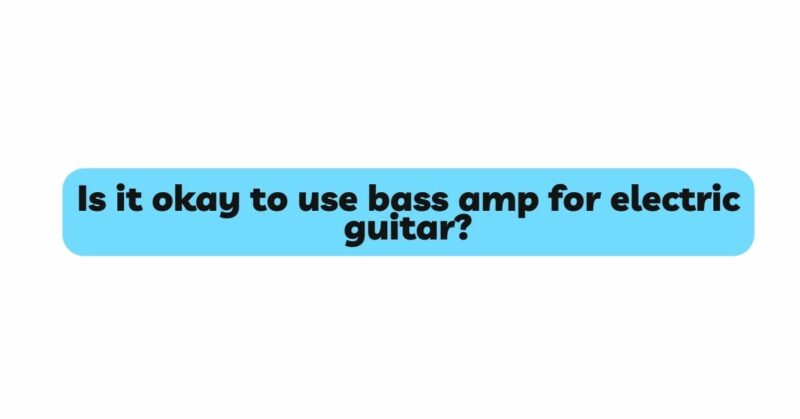In the dynamic world of music, experimentation is often the catalyst for innovation. One question that sparks curiosity is: Is it okay to use a bass amp for an electric guitar? This article delves into the intricacies of this unconventional approach, examining the potential benefits, challenges, and creative avenues that arise when harnessing the power of a bass amplifier to amplify the expressive tones of an electric guitar.
Understanding Bass Amps and Electric Guitars
Before delving into the compatibility of using a bass amp for an electric guitar, it’s essential to grasp the fundamental characteristics of each instrument and amplifier.
Bass Amps: Bass amplifiers are meticulously engineered to amplify the rich low-frequency tones produced by bass guitars. These amplifiers form the backbone of the rhythm and harmony in music, ensuring that the resonant bass notes are both felt and heard. Bass amps are tailored to accentuate the unique tonal qualities of bass guitars, offering a robust and foundational sound.
Electric Guitars: Electric guitars generate a diverse range of tones, from the warm and melodic to the edgy and distorted. These instruments produce harmonically rich overtones, offering musicians an array of sonic possibilities through different playing techniques, effects, and amplification choices.
Exploring the Viability of Using a Bass Amp for Electric Guitar
The idea of using a bass amplifier for an electric guitar might seem unconventional, but it can lead to intriguing outcomes and creative opportunities. Let’s explore the potential benefits and challenges of this approach.
Frequency Response and Tonal Characteristics
Bass Amps: Bass amplifiers are designed to emphasize low-frequency tones, typically ranging from 40 Hz to 1 kHz or beyond. Their construction centers on enhancing the depth and resonance of bass notes, creating a solid foundation for the music.
Electric Guitars: Electric guitars encompass a broader frequency range that spans both mid and high frequencies. They generate harmonically rich overtones that contribute to the instrument’s tonal complexity.
Potential Benefits: Using a bass amp for an electric guitar can lead to unique tonal textures. The emphasis on low frequencies might result in a warmer and fuller sound, especially when exploring clean and warm guitar tones.
Equalization and Tone Shaping
Bass Amps: Bass amps offer equalization controls that concentrate on low and low-mid frequencies. These controls allow bassists to sculpt a deep and resonant sound that serves as the musical foundation.
Electric Guitars: Electric guitar amplifiers provide equalization controls that focus on treble and midrange frequencies. These controls enable guitarists to shape their desired tonal profile, from bright and cutting to warm and mellow.
Potential Challenges: When using a bass amp for an electric guitar, careful equalization adjustments are crucial. Without proper adjustments, the guitar’s characteristic mid and high frequencies might be subdued, leading to a tonal imbalance.
Distortion and Overdrive
Bass Amps: Bass amps are engineered to handle the strong low-frequency output of bass guitars without excessive distortion. Some bass amps offer overdrive capabilities tailored to maintain the integrity of the bass frequencies.
Electric Guitars: Distortion and overdrive are integral components of electric guitar sounds, used to add character and intensity to the tones.
Creative Opportunities: Using a bass amp for an electric guitar allows for experimentation with overdrive and distortion. The amp’s response to the guitar’s signal can lead to unique tonal interactions and textures.
Sound Projection and Amplifier Power
Bass Amps: Bass amps are designed to project sound effectively, ensuring that the low-frequency tones are audible even in larger venues. They typically feature larger speaker cabinets and increased wattage to disperse bass frequencies.
Electric Guitars: Electric guitar amplifiers are engineered to project sound over varying distances, offering different wattage options and speaker configurations.
Potential Considerations: When using a bass amp for an electric guitar, the sound projection might differ from that of a traditional guitar amplifier. The guitar’s tonal nuances and projection might be impacted by the amp’s design and wattage.
Artistic Exploration and Unconventional Tones
Creative Potential: Using a bass amp for an electric guitar opens doors to unconventional sound exploration. Musicians who embrace this approach can achieve distinctive sonic textures that challenge the norm.
Conclusion
In conclusion, the question of whether it’s okay to use a bass amp for an electric guitar is met with a nuanced response. While unconventional, this approach offers a realm of creative possibilities and unique sonic outcomes. Musicians who experiment with this pairing should approach it with an open mind, understanding the potential benefits and challenges.
The compatibility of a bass amp with an electric guitar depends on the desired sonic palette and artistic intent. While a bass amp might not replace a dedicated electric guitar amplifier in all scenarios, it introduces a layer of versatility and innovation to the world of music amplification. As artists continue to push boundaries and explore uncharted territory, the use of a bass amp for an electric guitar contributes to the rich tapestry of musical expression.


